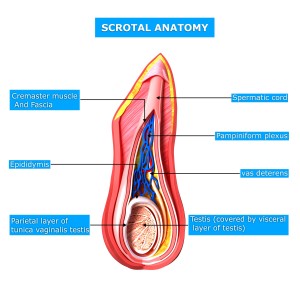 Chronic scrotal pain is defined as constant or intermittent pain in the scrotum lasting more than three months. It is a common problem which patients find very distressing. This distress may be worsted by the fact that the syndrome of chronic scrotal pain is poorly understood and often very difficult to treat.
Chronic scrotal pain is defined as constant or intermittent pain in the scrotum lasting more than three months. It is a common problem which patients find very distressing. This distress may be worsted by the fact that the syndrome of chronic scrotal pain is poorly understood and often very difficult to treat.
Chronic scrotal pain can have a multitude of physical causes within the scrotum including infection, testicular torsion, tumor, varicoceles or spermatoceles. The pain syndrome can follow trauma as well as injury after surgery on the scrotum or groin (vasectomy or inguinal hernia repair for example). Factors external to the scrotum can also be experienced as scrotal pain, including back problems, hip problems or kidney stones.
In the majority of cases however, no clear cause can be found. This poses a unique challenge for the treating surgeon, as there is no clear problem which can be fixed with surgery. Even if a surgical problem is found, treating it may not guarantee resolution of the pain since there may be long term changes in the nerves from the testicle itself. This impasse can result in frustration for the surgeon and the patient.
At Perth Urology Clinic we understand this frustration and the debilitating effect chronic scrotal pain can have on the patient. We approach the problem in a stepwise manner including history, examination and investigation to rule out any reversible cause of the pain. If none is found, a review by a pain physician to trial medications that target nerve pain or a review by a physiotherapist may be indicated. Surgery in chronic scrotal pain is really the last resort and will only be discussed if all else has failed.
This procedure involves an injection of local anesthetic around the testicular cord through a small needle. If the scrotal pain is caused by abnormal nerve signals originating in the testicle this procedure will temporarily resolve the pain. A positive response to a cord block predicts future success with denervation surgery.
If the scrotal pain started after a vasectomy, there may be an indication to perform a vasectomy reversal
Targeted microsurgical denervation of the spermatic cord is performed through a small groin incision under microscopic or robotic magnification. It aims to disrupt the abnormal nerve signals from the testicle permanently. This is achieved by dividing the pain nerves from the testicle using high magnification to avoid the tiny but essential arteries, veins and lymphatics which keep the testicle alive. It is helpful in over 80% of patients who have a temporary response to a cord block.